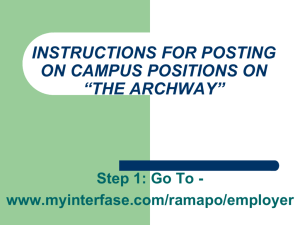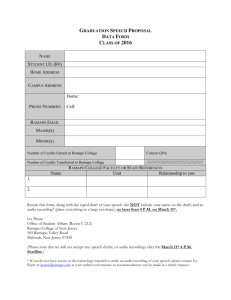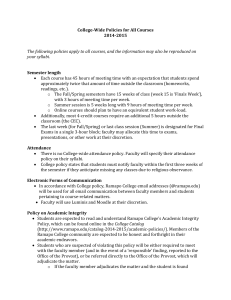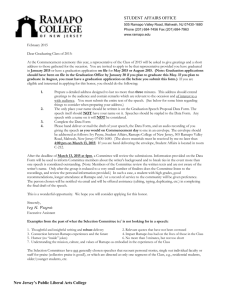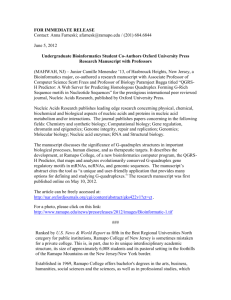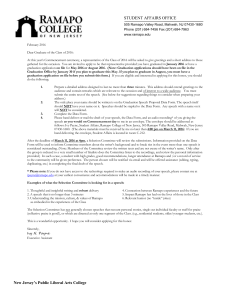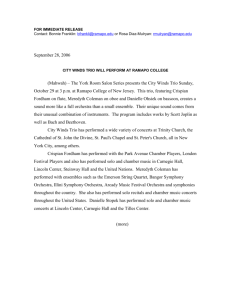Cooperative Education: Employer Responsibilities
advertisement
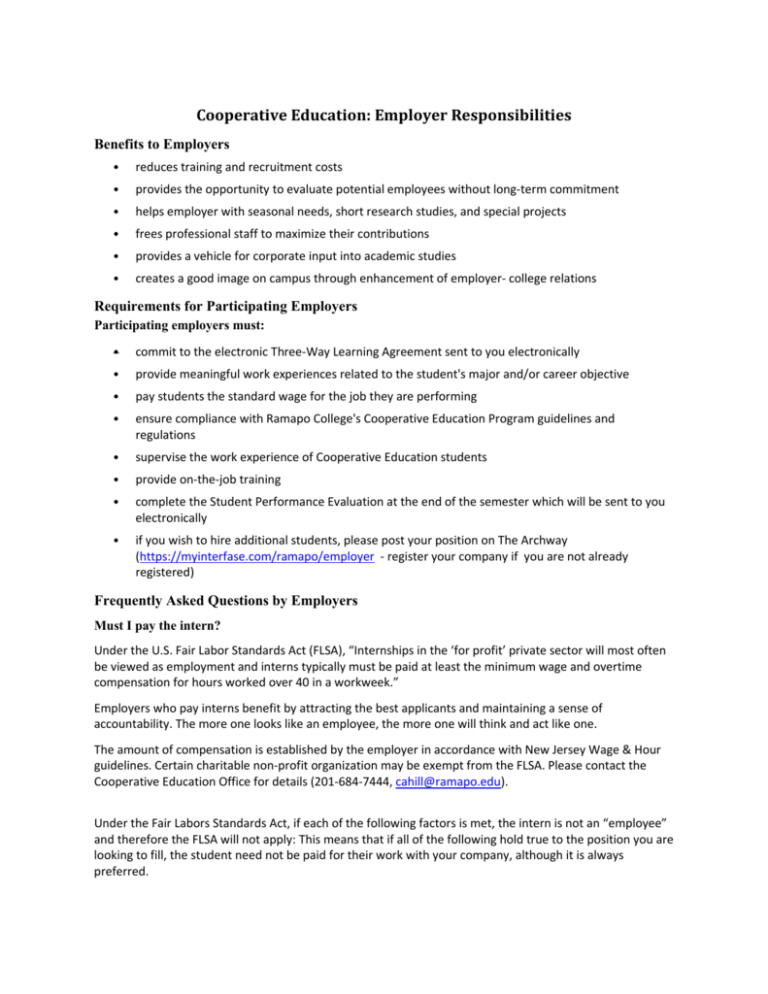
Cooperative Education: Employer Responsibilities Benefits to Employers • reduces training and recruitment costs • provides the opportunity to evaluate potential employees without long-term commitment • helps employer with seasonal needs, short research studies, and special projects • frees professional staff to maximize their contributions • provides a vehicle for corporate input into academic studies • creates a good image on campus through enhancement of employer- college relations Requirements for Participating Employers Participating employers must: • commit to the electronic Three-Way Learning Agreement sent to you electronically • provide meaningful work experiences related to the student's major and/or career objective • pay students the standard wage for the job they are performing • ensure compliance with Ramapo College's Cooperative Education Program guidelines and regulations • supervise the work experience of Cooperative Education students • provide on-the-job training • complete the Student Performance Evaluation at the end of the semester which will be sent to you electronically • if you wish to hire additional students, please post your position on The Archway (https://myinterfase.com/ramapo/employer - register your company if you are not already registered) Frequently Asked Questions by Employers Must I pay the intern? Under the U.S. Fair Labor Standards Act (FLSA), “Internships in the ‘for profit’ private sector will most often be viewed as employment and interns typically must be paid at least the minimum wage and overtime compensation for hours worked over 40 in a workweek.” Employers who pay interns benefit by attracting the best applicants and maintaining a sense of accountability. The more one looks like an employee, the more one will think and act like one. The amount of compensation is established by the employer in accordance with New Jersey Wage & Hour guidelines. Certain charitable non-profit organization may be exempt from the FLSA. Please contact the Cooperative Education Office for details (201-684-7444, cahill@ramapo.edu). Under the Fair Labors Standards Act, if each of the following factors is met, the intern is not an “employee” and therefore the FLSA will not apply: This means that if all of the following hold true to the position you are looking to fill, the student need not be paid for their work with your company, although it is always preferred. 1. The training is similar to what would be given in a vocational school or academic educational instruction 2. The training is for the benefit of the intern 3. The intern does not displace regular employees, but works under their close observation 4. The employer that provides the training derives no immediate advantage from the activities of the intern and on occasion its operations may actually be impeded 5. The intern is not necessarily entitled to a job at the conclusion of the training period 6. The employer and intern understand that the intern is not entitled to wages for the time spent in training. Employers must be careful with unpaid internships and ensure that all six factors set forth by the DOL are met. Perhaps the most common factor that can cause an intern to become an “employee” is when the intern performs the same type of work as the company’s regular employees such that a regular employee is displaced and/or the employer derives a material benefit from the intern’s work. For a more detailed explanation: http://www.dol.gov/whd/regs/compliance/whdfs71.pdf Fact Sheet #71 Internship Programs under the Fair Labor Standards Act Are we bound to a semester long placement? Yes. Employers agree to employ a student for the length of an academic semester. Each Cooperative Education course is worth either two or four academic credits. See below for hour requirements: 4 credits: a position of minimum 240 hours per semester Summer: 22 hrs/wk. for 11 weeks; Fall/Spring: 15 hrs/wk. for 16 weeks 2 credits: a position of minimum 120 hours per semester Summer: 11 hrs/wk. for 11 weeks; Fall/Spring: 7.5 hrs/wk. for 16 weeks What responsibilities must I provide the student? Employers should provide work experience that expands the opportunity for significant learning. Cooperative Education students are expected to apply knowledge gained from classroom experience as well as to develop new skills. Additional learning is achieved through academic requirements provided by Cooperative Education faculty advisors. However, if any concerns about the student or the job itself arise, contact the Cooperative Education staff immediately. Whom do I contact with any questions or concerns? Contact The Cahill Career Development Center and ask to speak with any experienced member of the Cooperative Education staff. The telephone number is 201-684- 7444. May I change a student's job description, hours or placement? If changing the initial agreement, please contact the Cooperative Education staff, 201- 684-7444. What are my obligations as a participant in the Cooperative Education Program? The requirements are to: fill out and commit to the electronic Three Way Learning Agreement, evaluate student work during the Cooperative Education placement, provide a valid learning experience, provide appropriate training and supervision, and complete a student performance evaluation at the end of the semester. How do I post a Cooperative Education position? Please go to The Archway: www.myinterfase.com/ramapo/employer If you are not already registered, register and if you have positions (internships and full-time), post them. Once your positions are approved, students can apply directly to you. If you have any questions, please contact one of the Career Advisors. Donna Kauder SSHGS & SSHS 201-684-7451 dkauder@ramapo.edu Pam Cohen Anisfield School of Business 201-684-7884 pcohen@ramapo.edu Dr. Eileen Quaglino School of Contemporary Arts 201-684-7455 equaglin@ramapo.edu Nicole Videla School of Theoretical and Applied Sciences 201-684-7454 nvidela@ramapo.edu Debra Stark Employee Relations Specialist and Alumni Advisor 201-684-7221 dstark@ramapo.edu What is Ramapo College's Equal Employment Opportunity Policy? Ramapo College is an equal opportunity College. It does not discriminate in admission, access to its programs, activities, treatment, nor employment of individuals on the basis of race/color, creed/religion, national origin, handicap/disability, age, gender or sexual orientation. As a participant in the Cooperative Education Program, you are expected to adhere to Ramapo College's Equal Employment Opportunity Policy in that all students referred to your company be judged and treated on a nondiscriminatory basis. Inquiries may be directed to the Office of Affirmative Action and Workplace Compliance, (201) 684-7514. The policy may be found at http://www.ramapo.edu/administration/affirmaction.html#policy The Agreement By employing a student through Ramapo College's Cooperative Education Program, the employer agrees in principle and practice to the conditions outlined in this document. The employer, the student, the Cooperative Education faculty advisor and the Cooperative Education staff agree to work together to achieve the desired benefits for all parties participating in the relationship. Every employer should take full advantage of Ramapo's new online job database, The Archway, reserved especially for Ramapo students and alumni. By registering your company, agency or firm with The Archway, you will be granted 24/7 access to student and alumni resumes. Whether your job openings are full time, part time, internships, Cooperatives, or volunteer work, there is a member of the Ramapo community waiting to fill the position! Please go to www.myinterfase.com/ramapo/employer and register if you are not already registered. How are students prepared for their Cooperative Education experience? Students are also required to attend mandatory orientation and reflection sessions facilitated by the Cahill staff. P:shared/cahill/co-op/Eileen/Employer Responsibilities eq 6/10/15
